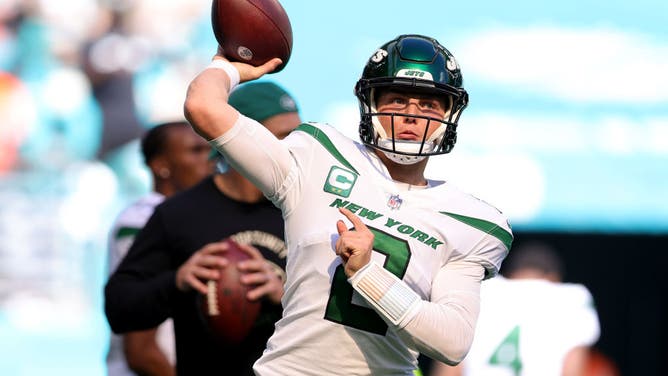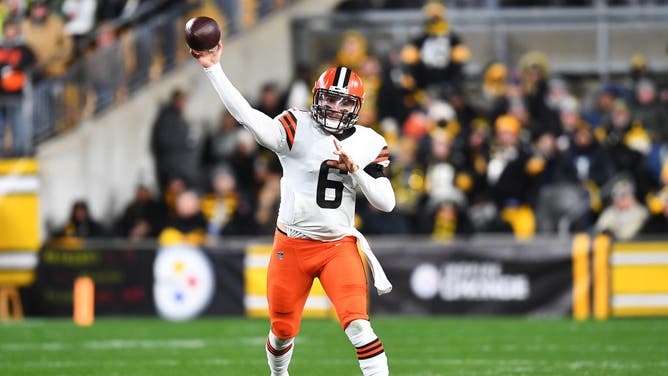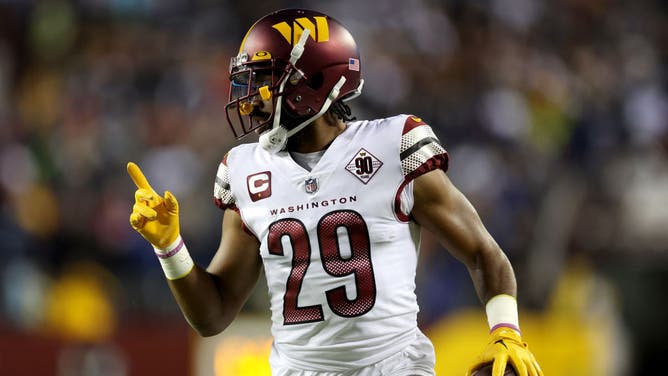Dispelling An NFL Draft Myth: Drafting The Wrong QB Does NOT 'Set Your Franchise Back Five Years' | Dan Zaksheske
There's a common refrain among people that drafting the wrong quarterback in the first round of the NFL Draft "sets your franchise back five years." That's just flat-out wrong. In fact, it's almost nearly the opposite.
Drafting a quarterback at the top of the NFL Draft is the SAFEST thing a team can do. I joined Dan Dakich on Don't @ Me on Thursday and explained this misconception.
WATCH:
Drafting a QB in the first round is the safest bet for teams
As I mentioned in the video, this comes down to cost-benefit analysis. Kirk Cousins, for example, carried a $31.4 million cap hit in 2022-23. Jared Goff costs about the same. But, because of the rookie wage scale, a player like Zach Wilson, drafted second overall in the 2021 NFL Draft, maxes out at $11.1 million in his fourth season.
In prior years, Wilson goes from $6.4M to $8M to $9.5M. Wilson is largely considered a bust. However, he costs just a fraction of what Cousins makes, for example. If Wilson indeed serves as the New York Jets backup in 2023, he'll count $9.5M against the cap.

Missing on Zach Wilson in the NFL Draft did not greatly cripple the New York Jets. (Photo by Megan Briggs/Getty Images)
That ranks 20th in the NFL among quarterback cap hits. That does not cripple a franchise. In fact, look at the teams who have "missed" on top quarterbacks in recent seasons.
The Jets just missed the playoffs last season and are looking to acquire Aaron Rodgers, likely making them legitimate contenders. The San Francisco 49ers traded a ton of draft capital and took Trey Lance at #3 overall in the same NFL Draft.
The 49ers reached the NFC Championship last season. They look like a contender to do it again. Did drafting the wrong quarterback set either of those franchises back? You could argue those picks would have been better spent, and that's true, but so much so that they would be THAT much better?
Unlikely.
People might say that the Cleveland Browns set their franchise back by taking Baker Mayfield in 2018. But did they? Even though Mayfield clearly is not a great NFL quarterback, they won a playoff game in 2020 -- their first since 1994 -- simply because they had a decent enough quarterback making (by NFL QB standards) practically no money.

Baker Mayfield didn't exactly fulfill promise as the top pick in the NFL Draft, but the Browns won a playoff game and have since moved on without destroying the franchise. (Photo by Joe Sargent/Getty Images)
The Jets whiffed on quarterback in the 2018 NFL Draft, too, taking Sam Darnold. But again, since then, they threw Darnold away and drafted Wilson. They missed twice in three NFL Drafts and still are considered a legitimate contender in 2023.
Yes, that's because of potentially adding Aaron Rodgers. But if missing on a quarterback crippled a franchise, they wouldn't be able to bring in Rodgers at all.
Cost-Benefit Analysis is important relative to the NFL Draft
The rookie wage scale makes young quarterbacks extremely valuable. They never make more than $11M against the cap in their first four seasons. The top players at the position -- like Patrick Mahomes -- command over $30 million.
And that number is only increasing. Deshaun Watson is set to count over $54M against the salary cap.
Now, let's look at other positions. Offensive tackle, for example, another popular position to select high in the NFL Draft. In 2022-23, the top tackle counted just over $21M against the cap (Garrett Boles). That $11M cap hit for fourth-year rookies ranks just outside the Top 10 at the position.
So, if you draft an offensive tackle with that selection, he needs to become Top 10, at least, by Year 4 to be providing just even value. What about cornerback? Kendall Fuller ranked as the sixth-highest paid corner against the salary cap last season. His number? $11.1 million.

Cornerback Kendall Fuller of the Washington Commanders celebrates while returning an interception for a touchdown. (Photo by Rob Carr/Getty Images)
So that Top 5 cornerback? He better be Top 5 in the NFL by Year 4, or you're losing value. Could that happen? Sure it could. But is it more likely you're going to nail that Top 5 cornerback pick, or get a quarterback who's within the best 25 at the position?
Missing on a cornerback or an offensive tackle is far more detrimental to a team than missing on a quarterback.
Despite the myth that people continue to repeat.